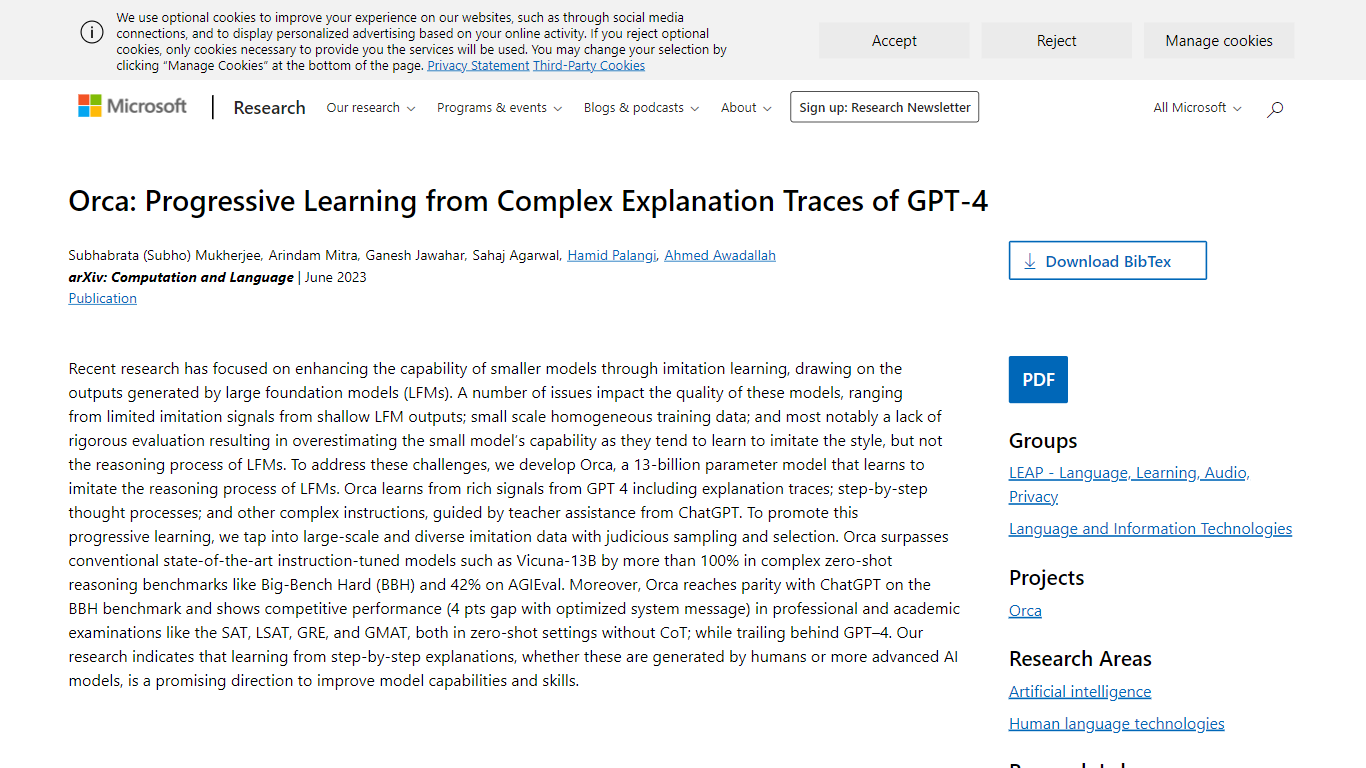Orca vs ggml.ai
Dive into the comparison of Orca vs ggml.ai and discover which AI Large Language Model (LLM) tool stands out. We examine alternatives, upvotes, features, reviews, pricing, and beyond.
When comparing Orca and ggml.ai, which one rises above the other?
When we compare Orca and ggml.ai, two exceptional large language model (llm) tools powered by artificial intelligence, and place them side by side, several key similarities and differences come to light. The upvote count reveals a draw, with both tools earning the same number of upvotes. Be a part of the decision-making process. Your vote could determine the winner.
Think we got it wrong? Cast your vote and show us who's boss!
Orca

What is Orca?
Recent advancements in artificial intelligence have paved the way for pioneering research in machine learning, specifically targeting the refinement of smaller AI models. Inspired by this notion, Microsoft Research introduces "Orca," a cutting-edge methodology designed to upgrade the learning processes of these compact AI constructs by utilizing the robust explanation traces produced by larger foundation models like GPT-4.
This innovative approach tackles several challenges encountered in the realm of AI imitation learning, such as the limited learning signals derived from the superficial outputs of larger models, the restrictive nature of small and homogeneous training datasets, and critically, the deficiency of stringent evaluation parameters that directly influence the overall quality and reliability of these models. Orca is a testament to Microsoft's commitment to evolving AI learning and potentiating smaller models' ability to reason, explain, and ultimately understand much like their large-scale counterparts.
ggml.ai

What is ggml.ai?
ggml.ai is at the forefront of AI technology, bringing powerful machine learning capabilities directly to the edge with its innovative tensor library. Built for large model support and high performance on common hardware platforms, ggml.ai enables developers to implement advanced AI algorithms without the need for specialized equipment. The platform, written in the efficient C programming language, offers 16-bit float and integer quantization support, along with automatic differentiation and various built-in optimization algorithms like ADAM and L-BFGS. It boasts optimized performance for Apple Silicon and leverages AVX/AVX2 intrinsics on x86 architectures. Web-based applications can also exploit its capabilities via WebAssembly and WASM SIMD support. With its zero runtime memory allocations and absence of third-party dependencies, ggml.ai presents a minimal and efficient solution for on-device inference.
Projects like whisper.cpp and llama.cpp demonstrate the high-performance inference capabilities of ggml.ai, with whisper.cpp providing speech-to-text solutions and llama.cpp focusing on efficient inference of Meta's LLaMA large language model. Moreover, the company welcomes contributions to its codebase and supports an open-core development model through the MIT license. As ggml.ai continues to expand, it seeks talented full-time developers with a shared vision for on-device inference to join their team.
Designed to push the envelope of AI at the edge, ggml.ai is a testament to the spirit of play and innovation in the AI community.
Orca Upvotes
ggml.ai Upvotes
Orca Top Features
Microsoft Research Initiative: Orca aims to enhance the capability of smaller AI models.
Leveraging GPT-4: Utilizes complex explanation traces from larger foundation models such as GPT-4.
Addressing Imitation Learning Limitations: Focuses on overcoming challenges encountered in standard imitation learning processes.
Boosting AI Quality: Improves rigorous evaluation metrics for better quality AI models.
Bridging the Learning Gap: Enables smaller models to mimic the reasoning and explanation processes of larger models.
ggml.ai Top Features
Written in C: Ensures high performance and compatibility across a range of platforms.
Optimization for Apple Silicon: Delivers efficient processing and lower latency on Apple devices.
Support for WebAssembly and WASM SIMD: Facilitates web applications to utilize machine learning capabilities.
No Third-Party Dependencies: Makes for an uncluttered codebase and convenient deployment.
Guided Language Output Support: Enhances human-computer interaction with more intuitive AI-generated responses.
Orca Category
- Large Language Model (LLM)
ggml.ai Category
- Large Language Model (LLM)
Orca Pricing Type
- Freemium
ggml.ai Pricing Type
- Freemium
